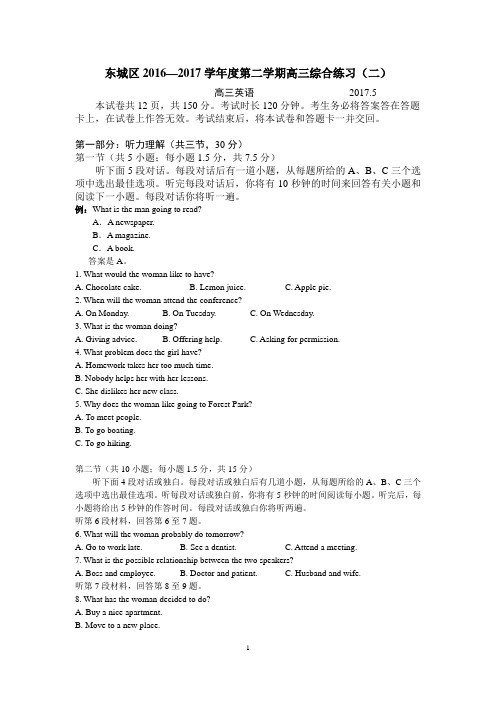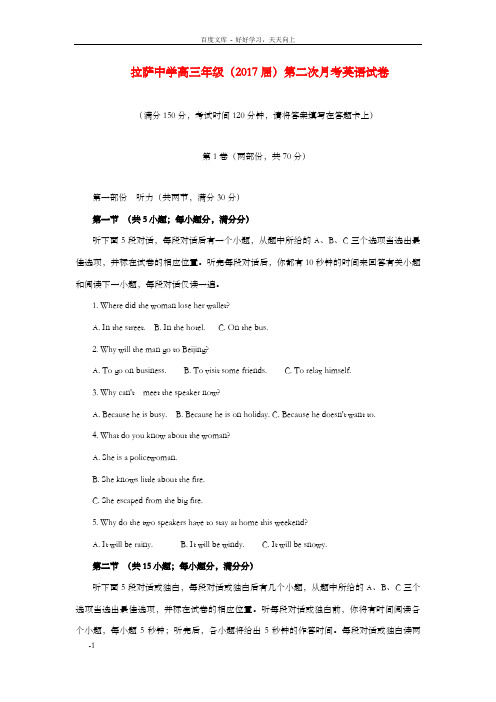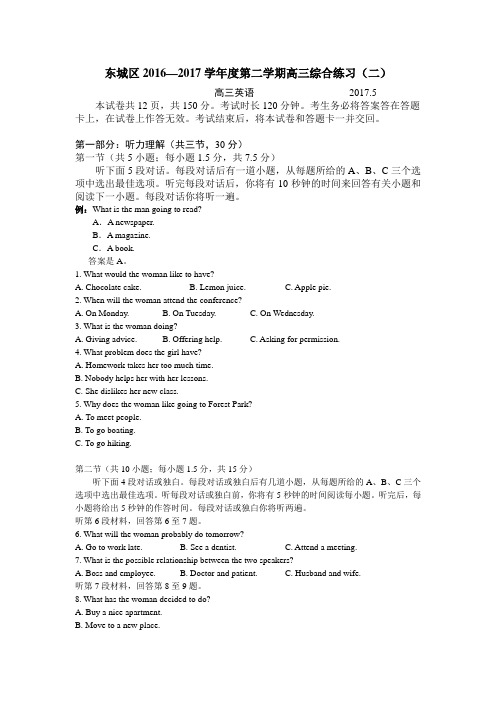北京市中央民族大学附属中学2017届高三2月月考英语试题
- 格式:doc
- 大小:465.50 KB
- 文档页数:19

2016—2017学年高三英语2月月考试卷考试时间:120分钟试卷满分:150分命题:高三集备组校对:高三集备组2017.2.6第一卷第一部分:听力(共20题;每小题1.5分,共30分)第一节(共5小题;每小题1. 5分,满分7. 5分)听下面5段对话。
每段对话后有一个小题,从题中所给的A、B、C三个选项中选出最佳选项,并标在试卷的相应位置。
听完每段对话后,你都有10秒钟的时间来回答有关小题和阅读下一小题。
每段对话仅读一遍。
1. What does the man mean?A. There is something wrong with the printer.B. The woman is unable to work the printer.C. There is probably a power failure.2. How are the prices in the restaurant?A. Reasonable.B. High.C. Low.3. What is the man’s problem?A. He has no patience to wait for his wife.B. He can’t see the sign clearly.C. He’s parked in the wrong place.4. What day is it when the conversation takes place?A. Saturday.B. Sunday.C. Monday.5. What will Nancy do?A. Play volleyball.B. Watch a game.C. Find a player.第二节(共15小题;每小题1.5分,满分22.5分)听下面5段对话或独白。
每段对话或独白后有几个小题,从题中所给的A、B、C三个选项中选出最佳选项,并标在试卷的相应位置。

东城区2016—2017学年度第二学期高三综合练习(二)高三英语2017.5 本试卷共12页,共150分。
考试时长120分钟。
考生务必将答案答在答题卡上,在试卷上作答无效。
考试结束后,将本试卷和答题卡一并交回。
第一部分:听力理解(共三节,30分)第一节(共5小题;每小题1.5分,共7.5分)听下面5段对话。
每段对话后有一道小题,从每题所给的A、B、C三个选项中选出最佳选项。
听完每段对话后,你将有10秒钟的时间来回答有关小题和阅读下一小题。
每段对话你将听一遍。
例:What is the man going to read?A.A newspaper.B.A magazine.C.A book.答案是A。
1. What would the woman like to have?A. Chocolate cake.B. Lemon juice.C. Apple pie.2. When will the woman attend the conference?A. On Monday.B. On Tuesday.C. On Wednesday.3. What is the woman doing?A. Giving advice.B. Offering help.C. Asking for permission.4. What problem does the girl have?A. Homework takes her too much time.B. Nobody helps her with her lessons.C. She dislikes her new class.5. Why does the woman like going to Forest Park?A. To meet people.B. To go boating.C. To go hiking.第二节(共10小题;每小题1.5分,共15分)听下面4段对话或独白。

拉萨中学高三年级(2017届)第二次月考英语试卷(满分150分,考试时间120分钟,请将答案填写在答题卡上)第1卷(两部份,共70分)第一部份听力(共两节,满分30分)第一节(共5小题;每小题分,满分分)听下面5段对话,每段对话后有一个小题,从题中所给的A、B、C三个选项当选出最佳选项,并标在试卷的相应位置。
听完每段对话后,你都有10秒钟的时间来回答有关小题和阅读下一小题,每段对话仅读一遍。
1. Where did the woman lose her wallet?A. In the street.B. In the hotel.C. On the bus.2. Why will the man go to Beijing?A. To go on business.B. To visit some friends.C. To relax himself.3. Why can't meet the speaker now?A. Because he is busy.B. Because he is on holiday.C. Because he doesn't want to.4. What do you know about the woman?A. She is a policewoman.B. She knows little about the fire.C. She escaped from the big fire.5. Why do the two speakers have to stay at home this weekend?A. It will be rainy.B. It will be windy.C. It will be snowy.第二节(共15小题;每小题分,满分分)听下面5段对话或独白,每段对话或独白后有几个小题,从题中所给的A、B、C三个选项当选出最佳选项,并标在试卷的相应位置。

2017届高三月考英语试题及答案(word版可编辑修改)编辑整理:尊敬的读者朋友们:这里是精品文档编辑中心,本文档内容是由我和我的同事精心编辑整理后发布的,发布之前我们对文中内容进行仔细校对,但是难免会有疏漏的地方,但是任然希望(2017届高三月考英语试题及答案(word版可编辑修改))的内容能够给您的工作和学习带来便利。
同时也真诚的希望收到您的建议和反馈,这将是我们进步的源泉,前进的动力。
本文可编辑可修改,如果觉得对您有帮助请收藏以便随时查阅,最后祝您生活愉快业绩进步,以下为2017届高三月考英语试题及答案(word版可编辑修改)的全部内容。
2017届高三第七次月考英语试题2016-12—20第Ⅰ 卷 (选择题,共 115 分)第一部分听力(共 20 小题;每小题 1。
5 分,共 30 分)第一节(共 5 小题;每小题 1。
5 分,满分 7.5 分)听下面 5 段对话。
每段对话后有一个小题,从题中所给的 A、B、C 三个选项中选出最佳选项,并标在试卷的相应位置。
听完每段对话后,你都有 10 秒钟的时间来回答有关小题和阅读下一小题。
每段对话仅读一遍.1.Where are the two speakers?A.In a bookstore.B.In the library.C.In the post office.2.How will the speakers get to their destination?A.By bus.B.By taxi.C.By subway.3.What was the man’s son doing at the supermarket?A.Working.B.Killing the time.C.Going shopping.4.How much does the man weigh now?A.80 pounds.B.120 pounds.C.160 pounds.5.What caused the car accident?A.Speed driving.B.The bad weather. C.Careless driving.第二节(共15小题;每小题1.5分,满分22.5分)听下面5段对话或独白.每段对话或独白后有几个小题,从题中所给的A、B、C三个选项中选出最佳选项,并标在试卷的相应位置。

2017届高三英语2月月考试题(带答案)2014级高三二月月考试题英语本试卷分第I卷(选择题)和第II卷(非选择题)两部分。
注意事项:1.答第I卷前考生务必将自己的姓名、准考证号填写在答题卡上。
2.选出每小题答案前,用2B铅笔把答题卡上对应题目的答案标号涂黑。
如需改动, 用橡皮擦干净后,再选涂其他答案标号框, 不能答在本试卷上,否则无效。
第I卷(共100分)第一部分:听力(共两节,满分30分)第一节(共小题;每小题1分,满分7分)听下面段对话。
每段对话后有一个小题,从题中所给的A、B、三个选项中选出最佳选项,并标在试卷的相应位置。
听完每段对话后,你都有10秒钟的时间回答有关小题和阅读下一小题。
每段对话仅读一遍。
1 hat des the an suggest the an d?A ash feer lthes at a tieB Use a different ashing ahineLet us use the ashing ahine first2 hat an be inferred abut the an?A She is ging t drp the lass tB She desn’t n h t siIt t her a lng tie t learn t si3 hat des the dtr ipl?A The an shuld ntinue using the ediineB She’ll be aa fr the ffie fr t dasThe an desn’t need anthing fr his ugh4 hat ill the an prbabl d next?A Bu the pants the an shed hiB ait until the pants are n saleL at pants ade f a different aterialhat an be inferred abut prfessr Burns?A She didn’t require an papers last seesterB She as re flexible last seesterShe grades papers ver quil第二节(共1小题)听下面段对话或独白。

东城区2016—2017学年度第二学期高三综合练习(二)高三英语2017.5 本试卷共12页,共150分。
考试时长120分钟。
考生务必将答案答在答题卡上,在试卷上作答无效。
考试结束后,将本试卷和答题卡一并交回。
第一部分:听力理解(共三节,30分)第一节(共5小题;每小题1.5分,共7.5分)听下面5段对话。
每段对话后有一道小题,从每题所给的A、B、C三个选项中选出最佳选项。
听完每段对话后,你将有10秒钟的时间来回答有关小题和阅读下一小题。
每段对话你将听一遍。
例:What is the man going to read?A.A newspaper.B.A magazine.C.A book.答案是A。
1. What would the woman like to have?A. Chocolate cake.B. Lemon juice.C. Apple pie.2. When will the woman attend the conference?A. On Monday.B. On Tuesday.C. On Wednesday.3. What is the woman doing?A. Giving advice.B. Offering help.C. Asking for permission.4. What problem does the girl have?A. Homework takes her too much time.B. Nobody helps her with her lessons.C. She dislikes her new class.5. Why does the woman like going to Forest Park?A. To meet people.B. To go boating.C. To go hiking.第二节(共10小题;每小题1.5分,共15分)听下面4段对话或独白。
一、高中英语阅读理解1.阅读理解Since we've headed into the snowy part of the year, it seems like a good time to solve a language puzzle that Eskimos have a huge number of words for snow. The idea was popularized by the now well-known expert Benjamin Lee Whorf in the 1940s. His number was approximately five Eskimo words for snow, but somehow the story was so wide spread and romantic that it got out of control and grew bigger and bigger.There are two problems with the concept of Eskimos having tons of words for snow.First, Eskimos speak at least two different languages—Inuit and Yupik. Just as we have talked about how English and many other languages developed from a common language called Proto-Indo-European, Inuit and Yupik come from a different common language called Eskimo-Aleut. So saying Eskimos have 100 words for snow is like saying Europeans have 100 words for kings or queens. It might be telling you something broad about culture, but it isn't really telling you much about language.The second problem is "What is a word?” The Inuit and Yupik languages make words in different ways from how we make words in English. For example, the West Greenlandic word 'siku,' (sea ice), is used as the root for 'sikursuit (pack ice), 'Sikuliaq (new ice), and 'sikurluk (melting ice). But it's not that West Greenlandic has so many more words for describing snow than English, it's just that West Greenlandic expresses ideas by combining meaningful units of language together into one word while English uses more phrases and compounds. We express all the same ideas; we just do it a little differently because of the way our language is built.So you're probably still wondering, "If it's not 50 or 100 or 400 words, how many is it?" Well, Woodbury lists 15 that are present in a Yupik dictionary published in 1984, but he says that depending on how you look at it this is not an exact number. It could be 12; it could be 24. But it's certainly not 100.Sometimes, the "hundred words for snow" puzzle is used to argue that because Eskimos have so many words for snow, they think about snow in ways that we can't even begin to imagine—that your language decides or limits your thoughts. Languages are just different. They don't decide what we are able to think about or are not able to think about. I can think about snow floating on water even if we don't have a word for that in English.So when you're out skiing or snowboarding or just shoveling your driveway this winter, don't believe the people who try to tell you that Eskimos have 100 words for snow.(1)Why are Eskimos thought to have so many words for snow?A. Because snow is everywhere where Eskimos live.B. Because the story about it got enriched and believed.C. Because snow is of great importance to Eskimos.D. Because Eskimos have great affection for snow.(2)How does the writer explain the first problem?A. By presenting figures.B. By making comparisons.C. By quoting sayings.D. By adopting idioms.(3)The example of the west Greenlandic word 'siku' shows that .A. the making of words varies from language to languageB. the Inuit and Yupik languages have more words for snowC. the richness of words and phrases leads to different ideasD. more phrases about snow are found in the English language(4)What conclusion can we safely draw from the last two paragraphs?A. Eskimos better understand snow than other people.B. Languages deeply influence people's ability to think.C. There is no point counting Eskimo's expressions for snow.D. What comes into our mind is limited by our language.【答案】(1)B(2)B(3)A(4)C【解析】【分析】本文是一篇说明文,介绍了爱斯基摩人描述雪的词语虽然多但并非传言中的100多个。
北京市中央民族大学附属中学2017届高三2月月考英语试题Word版含解析第Ⅰ卷(共115分)第二部分英语知识运用(共两节,满分45分)第一节单项填空(共15小题,每小题1分,满分15分)从A、B、C、D四个选项中,选出填入空白处的最佳选项,并在答题卡上将该选项涂黑。
1. —Don’t forget to bring your camera with you, Jack.—Oh, thank you. I wouldn’t bring it if you ________ me.A. wouldn’t remindB. haven’t remindedC. shouldn’t have remindedD. hadn’t reminded【答案】D【解析】考查错综条件的虚拟语气。
句意:——不要忘记带上你的相机,杰克。
——啊,谢谢。
如果你不提醒我,我不会带的。
本题主句涉及的时间是将来,从句涉及的时间是过去,条件从句表示的动作与主句表示的动作发生的时间并不一致,这时,谓语动词的形式要根据各自所表示的时间来调整,这种现象叫做错综时间虚拟语气。
本题从句表示与过去事实相反,过去事实上是“提醒”了,故用过去完成时。
2. —Is there anything else I can do for you, Jeff?—No. Thanks. I really appreciate ________ when you lent all your notes to me before the exam.A. oneB. itC. thatD. this【答案】B3. --The manager finally agreed to our new marketing proposals.--It never occurred to me you could succeed in persuading him to change his mind.A. whichB. whatC. thatD. if【答案】C【解析】试题分析:句意:--经理最后终于同意我们的新市场议案了。
2017届北京市中央民族大学附属中学高三上学期12月月考英语试题(word版)无答案本试卷共11页,共150分。
考试时间120分钟第一部分:听力理解(共三节,30分)第一节(共5小题;每小题1.5分,满分7.5分)听下面5段对话。
每段对话后有一道小题,从每题所给的A、B、C三个选项中选出最佳选项。
听完每段对话后,你将有10秒钟的时间来回答有关小题和阅读下一小题。
每段对话你将听一遍。
1. What sport does the man play now?A. BasketballB. FootballC. Badminton2. Where does the dialogue probably take place?A. In a restaurantB. At a grocery storeC. At a snack bar3. When will the man go for his holiday?A. In JuneB. In JulyC. In August4. What are the mainly talking about?A. ScholarshipB. MajorC. Travelling5. What does the woman think of the math puzzle?A. DifficultB. So-soC. Easy第二节(共10小题;每小题1.5分,满分15分)reservation for?A. November 10B. November17 C. November 17 and 1811. Which type of room does the man book?A. StandardB. DeluxeC. Suite12. How much does the man have to pay to hold the room?A. $220B. $160C. $50听第9段材料,回答第13至15题。
东城区2016—2017学年度第二学期高三综合练习(二)高三英语2017.5 本试卷共12页,共150分。
考试时长120分钟。
考生务必将答案答在答题卡上,在试卷上作答无效。
考试结束后,将本试卷和答题卡一并交回。
第一部分:听力理解(共三节,30分)第一节(共5小题;每小题1.5分,共7.5分)听下面5段对话。
每段对话后有一道小题,从每题所给的A、B、C三个选项中选出最佳选项。
听完每段对话后,你将有10秒钟的时间来回答有关小题和阅读下一小题。
每段对话你将听一遍。
例:What is the man going to read?A.A newspaper.B.A magazine.C.A book.答案是A。
1. What would the woman like to have?A. Chocolate cake.B. Lemon juice.C. Apple pie.2. When will the woman attend the conference?A. On Monday.B. On Tuesday.C. On Wednesday.3. What is the woman doing?A. Giving advice.B. Offering help.C. Asking for permission.4. What problem does the girl have?A. Homework takes her too much time.B. Nobody helps her with her lessons.C. She dislikes her new class.5. Why does the woman like going to Forest Park?A. To meet people.B. To go boating.C. To go hiking.第二节(共10小题;每小题1.5分,共15分)听下面4段对话或独白。
第Ⅰ卷(共115分)第二部分英语知识运用(共两节,满分45分)第一节单项填空(共15小题,每小题1分,满分15分)从A、B、C、D四个选项中,选出填入空白处的最佳选项,并在答题卡上将该选项涂黑。
1. —Don’t forget to bring your camera with you, Jack.—Oh, thank you. I wouldn’t bring it if you ________ me.A. wouldn’t remindB. haven’t remindedC. shouldn’t have remindedD. hadn’t reminded【答案】D【解析】考查错综条件的虚拟语气。
句意:——不要忘记带上你的相机,杰克。
——啊,谢谢。
如果你不提醒我,我不会带的。
本题主句涉及的时间是将来,从句涉及的时间是过去,条件从句表示的动作与主句表示的动作发生的时间并不一致,这时,谓语动词的形式要根据各自所表示的时间来调整,这种现象叫做错综时间虚拟语气。
本题从句表示与过去事实相反,过去事实上是“提醒”了,故用过去完成时。
2. —Is there anything else I can do for you, Jeff?—No. Thanks. I really appreciate ________ when you lent all your notes to me before the exam.A. oneB. itC. thatD. this【答案】B3. --The manager finally agreed to our new marketing proposals.--It never occurred to me you could succeed in persuading him to change his mind.A. whichB. whatC. thatD. if【答案】C【解析】试题分析:句意:--经理最后终于同意我们的新市场议案了。
--我从没有想到你能成功的说服他改变主意。
这里使用了固定句型:It occurs/occurred to sb that ….“某人突然想起…”,it是形式主语,that引导的是真正的主语从句,所以选C。
考点:考查固定句型4. This football player was accused of taking money for not scoring goals .A. by chanceB. on endC. in turnD. on purpose【答案】D【解析】短语辨析。
A.偶然;意外的 B. 连续的 C. 轮流;依次 D.有目的的;故意的。
根据题意,因为故意不进球,这个球员被指责拿了钱。
选D。
5. —Got your US visa?—Not yet. I ________ too busy to apply for an appointment, so I didn’t go to Shanghai last week.A. wasB. have beenC. had beenD. would be【答案】C【解析】句意:——你得到美国签证了吗?——还没有,我过去太忙以至于没有申请,因此我上周没有去上海。
根据后句时态可知,表示“过去的过去”应该用过去完成时。
6. The time isn't far away ________ you will have to take the College Entrance Examination.A. thatB. whenC. untilD. while【答案】B【名师点睛】从句连接词的选择第一步先确定是什么从句,此句表达“…的时刻不远”,前面有先行词the time,故为定语从句。
第二步分析从句的句子成分,看缺主语,宾语还是缺状语。
从句中缺时间状语,故用关系副词。
第三步确定连接词。
先行词指时间,所以用when。
7. This problem may lead to more serious ones if ________ unsolved.A. makingB. remainedC. keepD. left【解析】句意:如果这个问题仍然未被解决,将会导致更严重的问题。
只有left和remain可以表示“剩下的”;条件从句是省略句,省略了主语和be动词,还原应为the problem is left unsolved. B项remain为不及物动词,不能用被动形式。
故选D。
8. —Shall we watch Personal Tailor directed by Feng Xiaogang this weekend?—________. Isn’t it meaningful that we do some voluntary work in the nursing house?A. Couldn’t agree moreB. Forget itC. Don’t mention itD. How come 【答案】B【解析】考查情景交际。
句意:——这个周末我们看冯小刚导演的《私人定制》怎么样?——算了。
我们在疗养院做一些志愿工作不是很有意义吗?A项表示“非常同意”;B项表示“算了吧,忘了吧”;C项表示“不客气,别提了”;D项表示“为什么,怎么会……”。
故B项符合语境。
9. I like this jacket better than that one, but it costs almost three times ________.A. so muchB. as muchC. as manyD. so many【答案】B10. With her eyes the work attentively,she didn’t know what was happening outside.A. fixed onB. focusedC. fixing onD. focusing【答案】A【解析】考查分词结构。
Fix one’s eyes on…注意力集中于…;eyes与focus构成被动关系,on 也不能省略。
句意:因为她的注意力都集中在工作上,她不知道外面发生的事情。
11. —With the country’s pension fund gap becoming wider than ever, retirement age should be postponed immediately.—Easier said than done. ________ we take all factors into account, we shall be faced with some other social problems.A. UnlessB. UntilC. WhenD. Once【解析】句意:——随着国家养老金缺口越来越大,退休年龄应该立即推迟。
——说起来容易做起来难。
除非我们把所用因素考虑在内,否则我们将面临一些其他的社会问题。
Unless 除非;Until直到……;When当……时;Once一旦。
A项符合语境。
12. ________ twice a year, whether it is a car or bus or a truck, is the rule that every driver must obey in this city.A. ExaminedB. ExaminingC. Having been examinedD. Being examined【答案】D【解析】句意:一年检查车两次是这个城市每个司机必须要遵守的规则,无论是小汽车、公交车或是卡车。
此处作主语,故用动词的-ing形式,因为车是被检查,所以用被动。
故选C。
13. A number of high buildings have arisen ________ there was nothing a year ago but ruins.A. whenB. whereC. beforeD. until【答案】B【解析】句意:大量的建筑物在一年前除了废墟什么也没有的地方出现了。
此题考查地点状语从句,用where。
其他连词带入句子意义表达不对。
14. —Hi, Tom, have you checked the account yet?—Certainly, I ________ it five times even though you told me to do it twice.A. checkedB. will have checkedC. have been checkingD. had checked【答案】A15. --Do you know anyone in Paris?--No,I’ll make friends once .A. I have settledB. I’ll be settledC. I am settledD. I’m settling 【答案】C【解析】此题考查时态。
句意:——你在巴黎认识人吗?——没有,一旦安顿下来我就会交朋友。
此处once引导时间状语从句,once引导的从句不能用将来时,如果谓语动词是将来发生的动作,动词常用一般现在时来代替将来时。
故选C。
第二节完形填空(共20小题;每小题1.5分,满分30分)阅读下面短文,从短文后各题所给的四个选项(A、B、C和D)中,选出最佳选项,并在大一卡上涂黑。
One day, a train was approaching the small town of Cheekyville. On the train was a___16___guy with a big suitcase. He was called William Warbler and he lookedvery___17___indeed. But what made him unusual was the fact whenever he neededto___18___he did it by singing opera. It didn’t matter to William whether it was simply a matter of a nswering a brief greeting, like “good day”. Hewould___19___“Gooood dayyy to youuuuuu ...toooooo!”No one could get a normal,___20___word out of him. And, as no one knew how he made his living and he lived quite simply, always wearing his same old second-hand suit — they often___21___him.They___22___his singing, calling him “crazy”. William had been in Cheekyville for some years, when, one day, a rumor(谣言)___23___round the town: William had___24___a role in a very important opera in the nation’s capital, a nd there were posters everywhere____25____the event. Everyone in the capital to see it, and it was a great____26____. And to everyone's surprise in Cheekyville—when William wasbeing____27____by reporters, he answered their questions byspeaking____28____singing. And he did it with good____29____and with a clear and pleasant voice.From that day, William gave up singsing____30____. Now he did only during his stage appearances and world tours. Some people suspected____31____he had changed, but others still had no idea, and continued believing him to be somewhat mad. They wouldn’t have thought so____32____they had seen what William kept in his big suitcase. It was a large stone with a hand—carved message on it. It said “Practice every second, for you never know when your____33____will come.”Little did people that rather____34____he got the role in the opera becausethe____35____had heard William singing while out buying a newspaper.16. A. strange B. handsome C. funny D. sensitive17. A. strong B. special C. common D. anxious18. A. debate B. practice C. sing D. communicate19. A. shout B. respond C. repeat D. tease20. A. singing B. spoken C. written D. printed21. A. disrespected B. loved C. appreciated D. disturbed22. A. made fun of B. got addicted to C. took pride in D. made sense of23. A. developed B. reflected C. spread D. expressed24. A. refused B. ruined C. created D. got25. A. confirming B. advertising C. approving D. assessing26. A. benefit B. discovery C. success D. experience27. A. opposed B. blamed C. interviewed D. welcomed28. A. other than B. rather than C. more than D. less than29. A. service B. remarks C. signs D. manners30. A. at all hours B. at all points C. at certain time D. at times31. A. how B. why C. that D. where32. A. while B. because C. if D. since33. A. chance B. money C. inspiration D. wisdom34. A. carefully B. quickly C. naturally D. accidentally35. A. director B. writer C. actress D. teacher【答案】16. A 17. C 18. D 19. B 20. B 21. A 22. A 23. C 24.D 25. B 26. C 27. C 28. B 29. D 30. A 31. B 32. C 33. A34. D 35. A名师点睛:此文为夹叙夹议类完形填空,其解题步骤如下:第一步通读全文,理清文章的主旨大意。